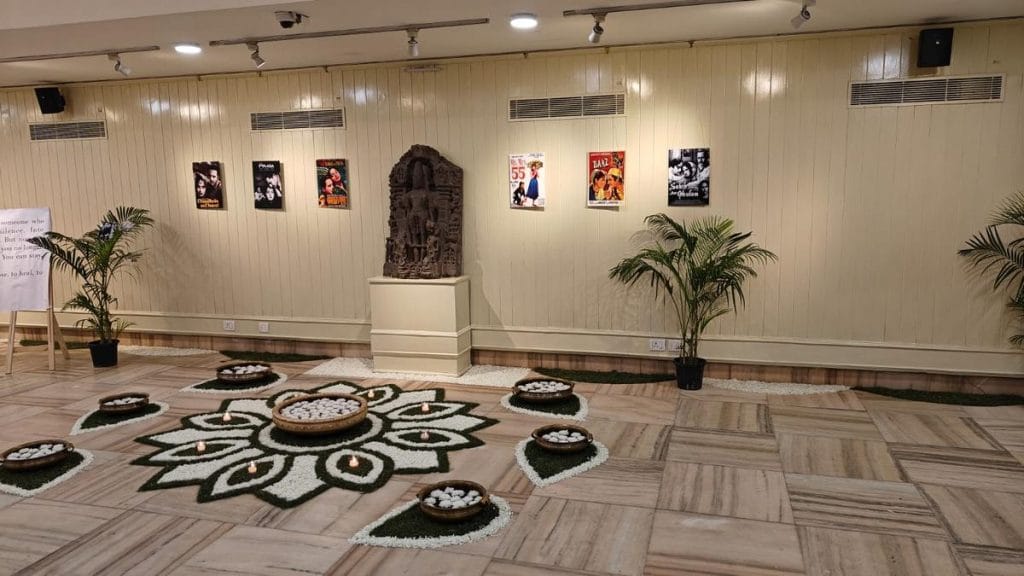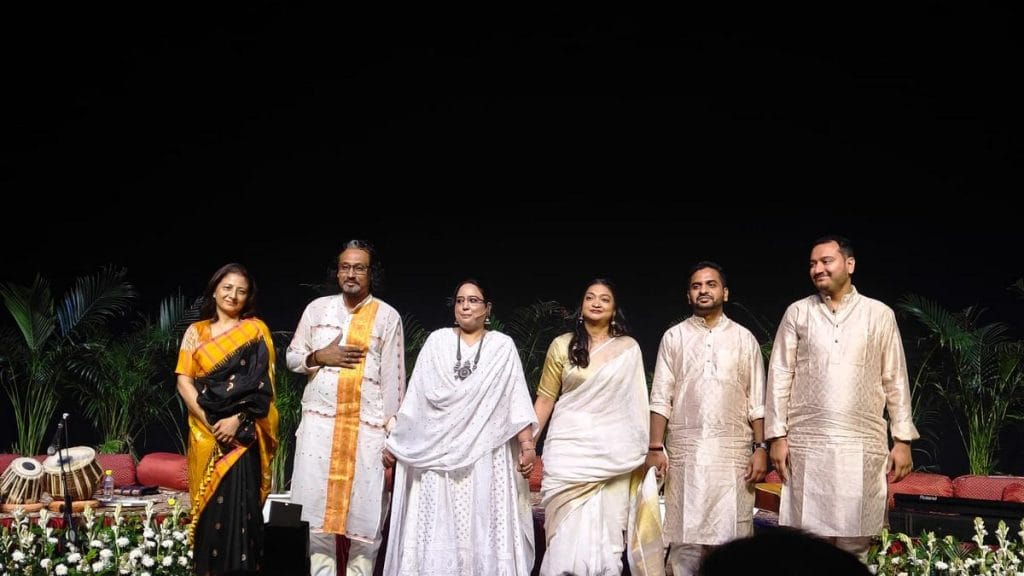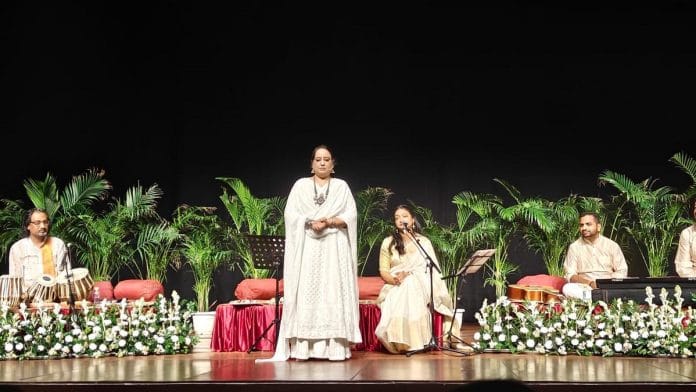New Delhi: The story of the multitalented yet tragic filmmaker and actor Guru Dutt was retold through an emotive dastangoi by Fouzia Dastango at Kamani Auditorium last Saturday. The performance impressed not just fans but also filmmaker Muzaffar Ali, who declared, “Is dastan ke baad aur koi dastan nahi” — there can be no other story after this one.
Marking the 100th birth anniversary of the filmmaker, Daastan-e-Guru Dutt was written by Abbas Qamar and researched by Asha Batra, founder of Cinemaazi, a private digital archive and research centre on Indian cinema. Fouzia was joined by Latika Jain, who sang some of the popular songs from Dutt’s films.
“Fouzia, you have poured your soul into the performance, and Miss Jain, you brought back an era with your singing,” said Ali, who attended the event with his wife and film producer Meera Ali.
The dastangoi—a Persian-Urdu storytelling tradition—began an hour late as people trickled in, having braved weekend traffic and skipped Diwali parties to watch the performance.
“The important thing to know is when to say ‘wah’ and when to clap,” said Fouzia with a smile as the audience waited with anticipation for the show to begin.
For the next hour and a half, the audience was transported to the era when Guru Dutt was alive, weaving his magic on celluloid. The auditorium was bursting at the seams, with people singing along, clapping, and giving a standing ovation when the tribute ended.

“I had attended Fouzia’s Meena Kumari dastangoi and was very impressed by how it was done. I spoke to her after that, and we decided to work together — Guru Dutt was my choice,” said Vikas Jalan, the presenter of the show. Once it was decided, Jalan and Fouzia prepared rigorously for six months for the first public performance at Kamani.
A private performance was held earlier at Gurgaon’s The Camellias on 4 October. Jalan, present at the final rehearsals and the private show, also shared inputs that were incorporated into the Saturday rendition, which spanned several interludes of Guru Dutt’s life, from his early days in Bollywood to his relationship with actor Waheeda Rehman.
Jalan said the dastangoi has now been invited to three musical festivals and the makers are preparing to have more shows in Delhi and other cities.
Also Read: A Muslim woman is telling Ramayana, Mahabharata stories in Urdu. ‘Stories belong to all’
‘Evoking’ Guru Dutt
Unlike traditional dastangois, Fouzia’s narration in Daastan-e-Guru Dutt was interspersed with songs that carried the story forward, especially through the dramatic, life-changing moments — be it his move to Mumbai to begin his filmmaking career or his first meeting with Geeta Roy. Latika Jain sang portions of ‘Tadbeer Se Bigdi Hui’, ‘Babuji Dheere Chalna’ and ‘Aeji Dil Par Hua Aisa Jaadoo’, with the audience humming along.
The performance illuminated pivotal influences in Dutt’s life, including his uncle BB Benegal, a designer and painter of cinema hoardings. One of Benegal’s paintings — a man with a snake coiled around his body — once inspired Dutt to dance silently before the Victoria Memorial before he joined films, giving outlet both to his artistic self and his disillusionment with his job.
It also narrated how Dutt met with Dev Anand on the sets of Hum Ek Hain in 1946. It was Anand’s first film as the hero, while Dutt was assistant director. A comic moment when their shirts were swapped by a washerman resulted in a lifelong friendship.

During this time, the two made a pact that if Anand ever produced a film, Dutt would direct it; if Dutt directed one, Anand would be his hero. Baazi was the culmination of that. It cemented not just the friendship, but also became the backdrop for Dutt’s romance with singer Geeta Roy, who’d later become his wife.
“The parameters were clear — each anecdote had to be authentic, insightful, and grounded in research. We avoided conjecture or sensationalism, focusing instead on the man behind the imagery. The intent was not to explain Guru Dutt, but to evoke him, leaving some questions open as his life itself remains,” said Batra.
Also Read: Guru Dutt built Bollywood’s most unlikely dream team—bus conductor, unknown writer, dancer
‘No one leaves the way you did’
Guru Dutt created a ‘dream team’, which comprised comedian Johnny Walker, writer-director Abrar Alvi, cinematographer VK Murthy, and director Raj Khosla. And then there was Waheeda Rehman, a young actor who became the cornerstone of his films and the subject of much speculation.
Neither Dutt nor Rehman directly addressed the rumours, during their seven-year association or after. The dastangoi also chose not to treat their bond as an affair.

“It was a deliberate choice. Their relationship has often been interpreted through rumours rather than facts. Guru Dutt was a private person who spoke only through his films. Waheeda ji has always said in interviews that their relationship was that of an artist and a director, rooted in friendship,” said Batra. “It will be unfair to impose conclusions when neither of them offered their truth.”
But the dastangoi did explore how Geeta Dutt felt about the friendship and its impact on their troubled marriage, culminating in a painful scene on the sets of the shelved film Gouri.
On the first day of shooting this film, Geeta Dutt’s debut as an actor, she was engrossed in getting her hair and makeup done. Dutt, who wanted her to look simple, grew frustrated and stormed into the makeup room, asking why she was taking so much time.
“What do you want? That I don’t look better than Waheeda Rehman?” asked Geeta Dutt.
The film, said to be an attempt to repair the marriage, failed to do so and was never released. It was around this juncture that the mood of the dastangoi also darkened. The audience grew quieter and there was no more humming.
By the end, even Fouzia’s voice had a quiver as she narrated the untimely and mysterious death of the man, whose film Pyaasa once ranked among TIME magazine’s greatest movies made since 1923.
The performance ended with a recitation of poet Kaifi Azmi’s tribute to Dutt:
“Rehne ko sadaa dahar mein aata nahin koi.
Tum jaise gaye, aise bhi jaata nahin koi.”
(No one comes to live in this world forever.
No one leaves the way you did.)
As the words faded, the stage darkened.
(Edited by Asavari Singh)






